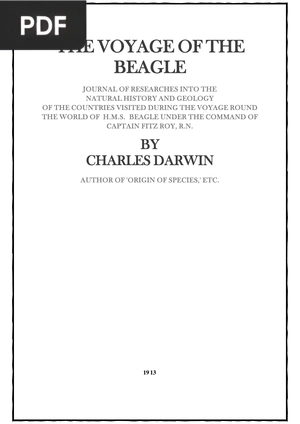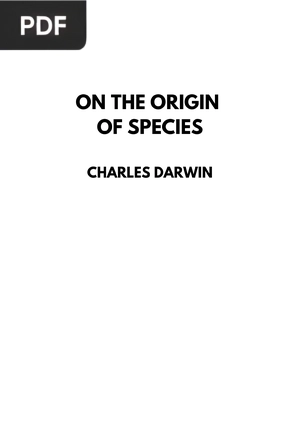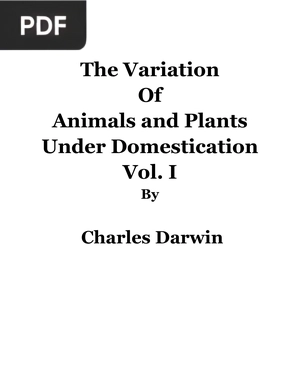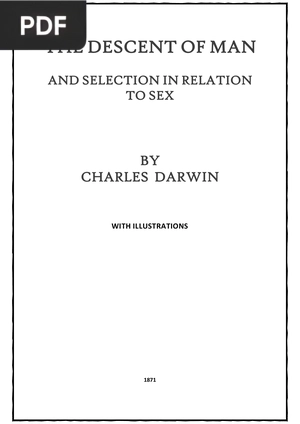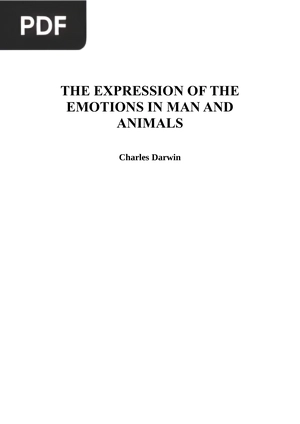The Autobiography of Charles Darwin
Author: Charles Darwin
*Wait a few seconds for the document to load, the time may vary depending on your internet connection. If you prefer, you can download the file by clicking on the link below.
Information
Description: <p>These are Charles Darwin’s words about his autobiography:</p> <p>«A German editor having written to me to ask for an account of the development of my mind and character with some sketch of my autobiography, I have thought that the attempt would amuse me, and might possibly interest my children or their children».</p> <p>«I know that it would have interested me greatly to have read even so short and dull a sketch of the mind of my grandfather written by himself, and what he thought and did and how he worked. I have attempted to write the following account of myself, as if I were a dead man in another world looking back at my own life».</p> <p>«Nor have I found this difficult, for life is nearly over with me. I have taken no pains about my style of writing».</p>
Pages: 44
Megabytes: 0.27 MB
This may interest you
The Voyage of the Beagle
Extension: PDF | 477 pages
<p>In 1831, at the age of 22, Charles Darwin began his scientific experience with a singular adventure: a voyage around the world.</p> <p>On board the Beagle, as a naturalist, the researcher would begin to keep a detailed diary during the five-year voyage.</p> <p>From this adventure he would obtain the knowledge and evidence that would later allow him to establish his evolutionary theory. Both the comparative analysis of American finches and the discovery of marine fossils in the Andean peaks were essential milestones, as described in <strong>The Voyage of the Beagle</strong>, in the development of his discoveries.</p>
On the Origin of Species
Extension: PDF | 321 pages
<p>This is the work that changed the world’s view of evolution and in which Darwin invested more than twenty years of his life.</p> <p>In short, <strong>On the Origin of Species</strong> was a milestone in the scientific world and in the way history was known until then. In these pages, the author expounded his theory on natural selection and argues that species were not created by a divine force, but that in the beginning there were simpler forms that mutated and evolved over time to adapt to the environment.</p> <p>Darwin’s ideas continue to generate controversy. This masterpiece is the most influential book in natural history and, therefore, in the history of mankind.</p>
The Variation of Animals and Plants Under Domestication Vol 1
Extension: PDF | 301 pages
<p>The main thesis put forward by Darwin in this book was that humans shared physical and structural attributes with other primates. The researcher reached this conclusion based on the data he extracted from studies of embryology, comparative anatomy and physiology.</p> <p>Ahead of the discussions on the origin of mankind, Darwin hinted in his book that the first ancestors of man had lived on the African continent, an assumption that would be confirmed during the 20th century by discoveries in the field of paleoanthropology.</p> <p>In <strong>The Variation of Animals and Plants Under Domestication</strong>, Darwin concluded by affirming that of all the reasons or causes that had generated the differences in external aspects between human lineages, and to a certain extent between these and lower animals, the most effective had been sexual selection.</p>
The Descent of Man
Extension: PDF | 691 pages
<p>This book by Charles Darwin represents one of the richest sources of current biological thought. It is a work in which the researcher clarifies the origin of plant and animal life, which was lost in myths and legends.</p> <p>Charles deduced, simultaneously with Wallace, the process of evolution of the species through the selection of the fittest individuals, presenting a set of facts that removed what for centuries was considered the truth about the origin of man.</p> <p>An essential text, <strong>The Descent of Man</strong> constitutes a continuity between the human species and other animals. This work tries to answer the question of what place do we occupy in this evolutionary history?</p>
The Expression of the Emotions in Man and Animals
Extension: PDF | 137 pages
<p><strong>The aim of The Expression of the Emotions in Man and Animals</strong>, one of Charles Darwin’s most captivating texts, was to detail the main expressive actions generated by humans and other animals. Expressions generated mainly in primates and in domestic animals such as cats, dogs, horses, etc. In addition, this book also explains the origin and development of these actions.</p> <p>The results and the comparison of them, allowed Darwin to identify several universal facial expressions, which points to a common origin and also supports the theory of evolution by natural selection, which is what the author intended with this research.</p> <p>As an additional point, the information contained in this book, as well as its evolutionary interpretation, challenged head-on the racist beliefs of the time.</p>


